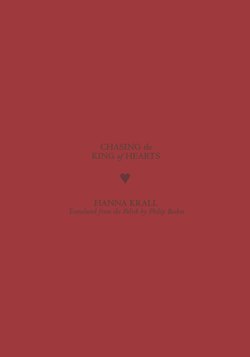Читать книгу Chasing the King of Hearts - Ханна Кралль - Страница 18
На сайте Литреса книга снята с продажи.
ОглавлениеA Request
She waits by the manhole. The sun goes down, but there’s no sign of Bolek. Sirens signal an air raid. She heads to the nearby garrison chapel. She opens the door and takes a few steps in the dark. A priest is standing in the aisle holding a book. Just saying my prayers . . . He smiles at her. They’re close to the ghetto wall and can hear single shots from the other side. My God, the things going on over there, the priest whispers, and turns his head toward the shooting. My husband is over there, she whispers. The priest places his hand on her shoulder and says: I’ll pray for him, what more can I do? And with his other hand, the one holding the prayer book, he makes a helpless gesture (which reminds her a little of Jurek Gajer before she was marched off to Umschlagplatz: “I can’t do anything to help you, you see for yourself.”). You could give him a baptismal certificate, Father, she suggests. Just one, for a young man. The priest doesn’t reply. And a place to stay? The priest thinks for a moment. Please come back, he says, and breaks out in a violent, hacking cough. Best would be two places, she quickly adds, speaking over the cough, but the priest clears his throat, covers his mouth with a handkerchief, and retreats to the sacristy.
She returns a few days later. She wants to explain to the priest why she asked for two places to stay. One is for people with “bad” looks who can’t show themselves on the street, who speak with a strong Yiddish accent; the other is for people with fairly “good” looks who speak proper Polish. The second one, she plans to explain, wouldn’t be all that risky.
She asks a nun about the priest: slender, not young, with a persistent cough.
You must mean Father Franciszek, the nun concludes. Franciszek Pauliński. He’s in the tuberculosis ward on Wolska Street.
She buys a lemon at the Kiercelak market and goes to the hospital.
The priest is dozing.
She looks at him. He’s not going to find any place at all, she thinks sadly. Not for people with “good” looks and not for people with “bad” ones.
It’s you . . . The priest opens his eyes and peers at her. Will you pray for me?
For you, Father? Me!
You, child. You won’t forget, will you?
She leans over the man’s bed.
I’m not a child of the same God as you, Father. That’s not a God I turn to. And that God doesn’t treat me justly. Or my parents. Or my husband . . .
She speaks louder and louder, with her new, high-pitched, quarrelsome voice. The nurse tells her to be quiet. By the time she leaves she has calmed down: Father Franciszek asked her to pray for him. If the rector of the Pallottines himself is asking her for such a favor, then it means there’s something on this earth that does depend on her. At least a prayer.
She visits him a few times. She brings him a book from the Szuberts’ library called The New Temple, in which some Norwegian suggests that we seek God in nature, that richest of all tomes. The advice sounds good to Izolda. Sitting on the hospital bed, she reads out loud to the priest: about green meadows embroidered with yellow and pink flowers, about the waves of hills, about azure fjords and verdant fields and migratory birds and the secret resonance of the soul in nature. Unfortunately the priest isn’t concerned with birds or fields or fjords. The priest is dying.
